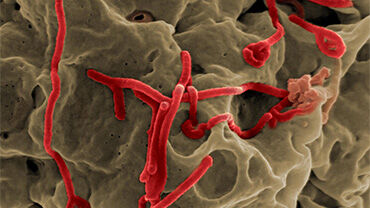Postcard from the field: A ‘Field Mission’ from my living room - supporting the WHO epidemiology team during the 11th Ebola outbreak in the Democratic Republic of Congo
Postcard from the field by Natalie Fischer, EUPHEM cohort 2019.
By September 2020 there was no more denying that we, the fellows of 2019, would be the ‘pandemic cohort’ - or at least one of them for all we knew. Battling COVID-19 in our respective host countries was taking up most of our time. Amidst the COVID-19 pandemic however, other diseases had not gone away – one of them being Ebola.
On the 1 of June 2020, WHO declared the 11th epidemic of Ebola Virus Disease (EVD) in the province of Equateur in the Democratic Republic of Congo (DRC). The epidemiological and surveillance teams within the Health Emergencies Programme at WHO headquarters were called upon to support colleagues from the regional and country offices and the DRC Ministry of Health with epidemiological analysis and monitoring of surveillance activities and performance. At the time of my deployment on the 18 of September 2020, 123 EVD cases including 50 deaths had been recorded in 12 affected health zones in the province.
When I received the news from the Global Outbreak Alert and Response Network (GOARN) that I was selected for the mission, I was beyond excited. When learning that the mission was done through remote work, I felt a wave of disappointment that was soon gone when I joined the team led by a former fellow (EPIET cohort 15) who was urgently waiting for support and extended a very warm welcome. She was leading the team from her home in Geneva and two other teammates were located in the United states, while I was in Belgium – we made up quite an international crew. Besides the geographical distance and time difference, I was impressed with the levels of organisation and communication we achieved as a team.
All the databases were kept and shared among all partners on a secured cloud server online. All data analysis was done in R programming, all codes were shared on the server, and new codes were generated collaboratively by the team. We used a variety of communication apps to conduct three-level conference calls with the field, maintain topic and task specific communication threads to coordinate our work and for the occasional online happy hour to say our farewell to any team member ending their deployment. Besides the challenge of working remotely, it was one of the best teamwork experiences I ever had, and I have to thank my colleagues for that.
Our team was tasked to prepare an up-to-date slide deck with analysis of the surveillance data for senior management, three times a week. Additionally, each week the team would brainstorm on a topic and divide tasks for the shared analysis in our Thursday morning EVD deep dive presented at the WHO health emergencies meeting. During my deployment, I prepared deep dives on case fatality rates, the situation in each health zone, transmission chains, alerts per health zone and contact tracing.
Towards the end of my deployment, when there were no more new cases, we supported the field team in trying to tie up the transmission chains into one chain of events through epidemiological investigations. Reading about the possible routes of infection, course of disease and treatment of each case during the review of case reports made me even more aware of the challenges faced by patients and public health professionals during an EVD outbreak.
In those last weeks, I was able to apply my background in microbiology and next generation sequencing, as we had access to whole genome sequencing data from Ebola virus samples, generated by the National Institute for Biomedical Research (INRB) in Kinshasa. Our team worked on a data analysis workflow and visualisation tools to combine the phylogenetic tree side by side with transmission chains, in order to draw conclusions from one another. I conducted a literature review and wrote a report for the team, which spurred interesting discussions about the use of sequencing during past Ebola epidemics and its advantages and limitations for outbreak investigation.
Coinciding with my last week of deployment, the outbreak was declared over on the 19 November 2020. The team was later congratulated by the executive director of WHO’s Health Emergencies Programme for our excellent work and contribution during the outbreak which brought a big smile to my face. It made me feel privileged and thankful to have had the opportunity to be part of the team and having shared this experience.
Read more
Postcards from the field
EPIET/EUPHEM fellows share their experience, read their postcards from the field





